-
Car Reviews
- Car News
-
Car Comparisons
Latest comparisons
- Chasing Deals
BMW’s first front-wheel drive 1 Series was welcomed with faint praise at best. Thankfully, the new 128ti variant addresses many of the car’s shortcomings
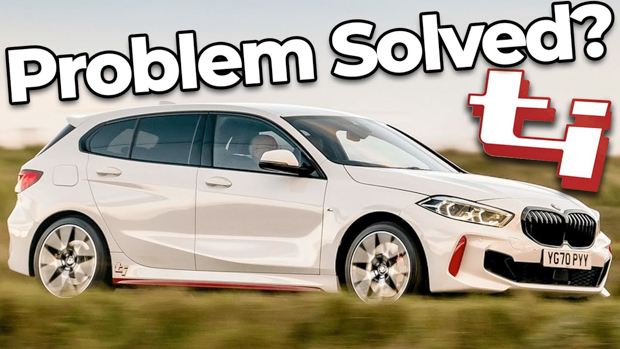
When the F40-generation BMW 1 Series adopted the front-wheel-drive (FWD) UKL2 platform in 2019, buyers and the motoring press alike were sceptical. A front-drive hatch may offer more practical packaging, but surely it would dilute BMW’s driver-focussed image. Could a FWD 1 Series live up to the lineage of the two preceding generations of rear-drive hot hatches from BMW?
It turns out that the BMW community was right to be sceptical – especially in Australia, where buyers were initially given a narrow choice of either a stiff-riding three-cylinder 118i M Sport ($46,990 before on-road costs) or an all-wheel drive two-litre M135i xDrive flagship ($64,990) that we found was unfortunately prone to understeer.
Enter the new 128ti ($56,900) – a new variant sent rapidly to market to resolve many of the issues that plagued the lacklustre new 1 Series: namely it adopts the M135i’s sway bars and front limited slip differential while forgoing that car’s Haldex AWD system and picking up a heavily revised suspension set-up. The 128ti also does service in giving BMW a direct rival to the Volkswagen Golf GTI ($54,490) and Hyundai i30 N Premium ($49,000).
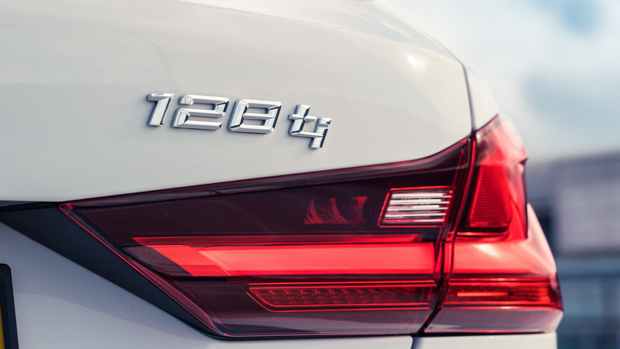
Other changes to the 128ti include a unique exterior treatment with black kidney grilles and red accents on the front air dams, side skirts and insignia down the hatch’s flanks (though if you’re not a fan, these markings can be removed at no cost).
What exactly is a ‘ti’, though? Well BMW says the letters stand for ‘Turismo Internazionale’ that first adorned sporty examples of the 1800 and 2000 ‘Neue Klasse’ sedans. Younger buyers will likely identify more with the more affordable 318ti (1996-2000) and 325ti (2003-2005) hatches that opened the 3 Series up to a broader demographic.
BMW has sent its new ti-adorned 1 Series into battle in one of the most competitive and well-loved market segments with rivals like the excellent i30 N, RS Megane and the Golf GTI – tough stuff. So, how does the revised FWD BMW fare?
While it boasts a premium badge, the 128ti costs a mere $2500 more than the mainstream Volkswagen Golf GTI and boasts an identical 180kW power output – though the BMW is torquier by 10Nm, with 380Nm on tap. Those numbers are good for a claimed 0-100km/h sprint of 6.2sec.
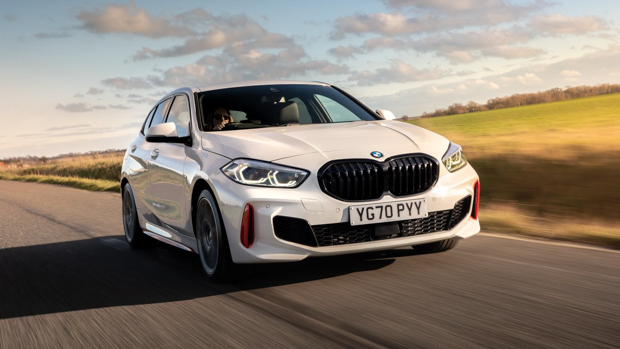
BMW rarely disappoints with engines and the M135i’s B48 was the least of the F40’s problems – the same engine is used here, down by 45kW/20Nm and without the Haldex AWD system. Due to our climate, the 128ti’s outputs are modestly reduced by 15kW/20Nm, but the broad torque spread (from 1750-4000rpm) makes this 128ti nippy and responsive.
Though the eight-speed torque converter automatic transmission is sourced from Aisin rather than ZF, BMW’s programming might be the best in the business. In Comfort mode, the 128ti mooches smoothly at low speeds with no transmission jerkiness, yet selecting Sport quickens the changes noticeably. The transmission is very responsive to manual inputs from the steering wheel paddles and is more cohesive than the seven-speed dual-clutch used in the Mercedes-Benz A250.
There’s also a pleasing soundtrack to accompany the rising revs, 128ti’s more guttural note from its sports exhaust suits the ti’s hot hatch character to a tee.
But what we’re really interested in is how BMW has developed its FWD chassis tune for the 128ti. Ditching AWD means the 128ti is 80kg lighter than the M135i, immediately freeing a higher level of agility, and putting its 1435kg figure in the ballpark of a Golf GTI (1409kg).
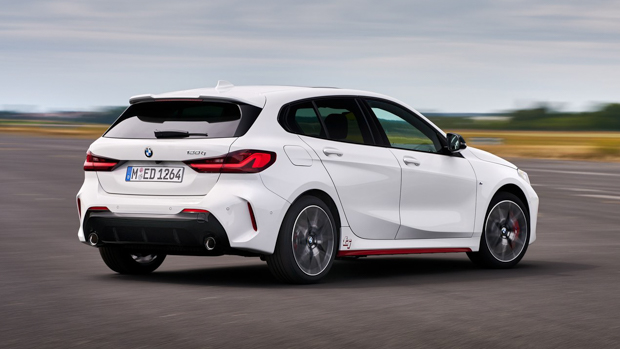
Unlike the adaptively-damped GTI, the 128ti has single-setting passive dampers – though BMW has done a good job on the suspension tune. Yes, the 128ti is firmer than your average hatch, but the dampers are of high quality and they round sharp edges off beautifully. The 128ti also displays excellent body control with mid-corner compressions never upsetting the car’s poise. That said, the 128ti is so secure it is ultimately a bit benign in character compared to lairier hot hatches that also ride well.
Where a hot Golf or Megane will happily edge their rear axles out under a trailing brake, achieving a more ideal stance for quick corner exit, the 128ti tracks through a corner neutrally. It splits bends into three phases: crisp turn-in from the well-weighted steering rack is followed by waiting for slight understeer in the mid corner, before the Torsen limited-slip differential drags the 128ti out under power. The LSD’s locking under throttle may be reduced from 36 percent in the M135i to 31 percent, but it still feels to be working effectively.
The differential is assisted by a traction control system called ‘ARB’ by BMW (similar to early ‘ASC’ systems that worked via a cable and separate throttle body) adapted from the electric i3 city car. ARB is said to metre power out more smoothly by proactively limiting throttle opening rather than applying the brakes.
For my preference, the 128ti lacks a whisper of initial front-end bite that could be achieved with stickier tyres than the 225/40 R18 Pirelli P Zeros fitted to this car, additional negative camber, firmer front springs or a combination of all three.
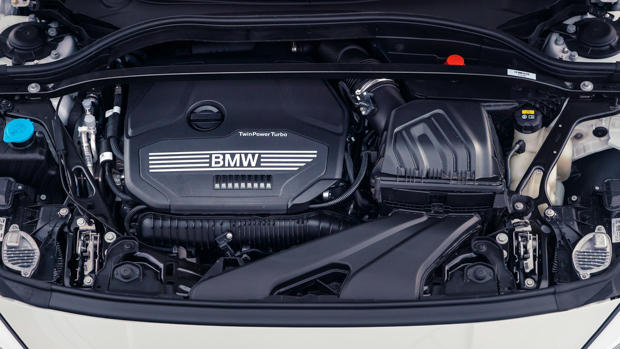
The brake pedal isn’t hugely confidence inspiring either with a mushy initial bite, though when you ask for more there is strong stopping power on offer from the four-piston front calipers (painted red, naturally).
Ultimately pulling back from close to the tyre’s limits is where the 128ti feels happiest, because despite lacking the last five percent of hot hatch perfection this is a very confidence inspiring car that has a surprising turn of speed on a back road.
The 128ti’s safety package includes forward AEB with pedestrian and cyclist detection, blind-spot monitoring and an inconsistent lane-departure warning. Our test car was fitted with optional adaptive cruise with stop and go function. ANCAP awarded the 1 Series range five stars in its 2019 protocol.
The revival of the ‘ti’ badge was evidently important to BMW. This is a sporty vehicle, sure, but it’s clearly not a full-fat M product, it’s less serious – and it has a charm all of its own.
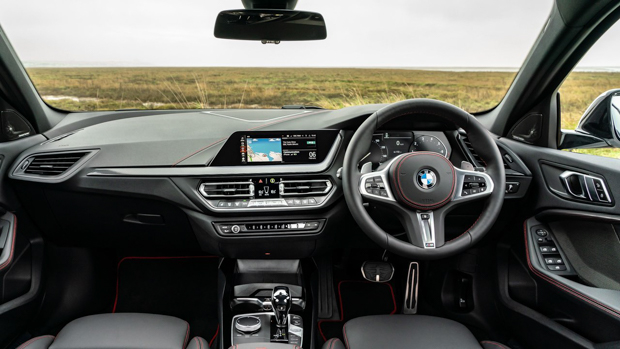
The 128ti’s sporty and supportive seats are trimmed in a combination of cloth and leather. They look good, too, with eye-catching red accents in the ‘sensatec’ centres. The low-set pews also feature electric adjustment and lumbar with pneumatic leather-appointed bolsters to hold in drivers of all different sizes – a feature few hot hatches offer.
There are soft mould plastic materials on the dash and door tops as you’d expect from a premium vehicle, and the windows are large, giving the 1 Series an airier cabin than some larger BMW models.
Our test car featured a $3900 enhancement pack that covers the cost of metallic paint outside, a panoramic sunroof inside and adaptive cruise control with stop and go.
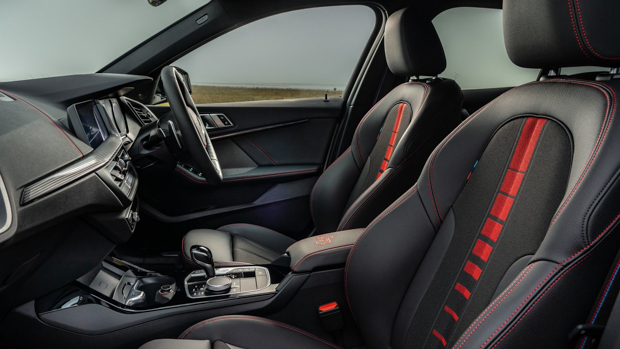
The technology found in the 1 Series’ cabin is among the best in the segment. The 10.25-inch touchscreen has large targets that are easy to select and it’s perfectly responsive. Controls for the dual-zone climate control are physical and found beneath the touchscreen and work seamlessly.
The inclusion of both wireless Apple CarPlay and Android Auto and powerful 10-speaker Harman Kardon stereo are great too – only the dull graphics of the 12.3-inch digital driver’s display let the 128ti’s cabin down a little.
Ongoing semiconductor shortages are responsible for equipment deletions for the 128ti. In the case of our test car, wireless charging was not present, though a head-up display was fitted. This can differ between individual vehicles rolling down the production line, so check carefully with your dealer before ordering.
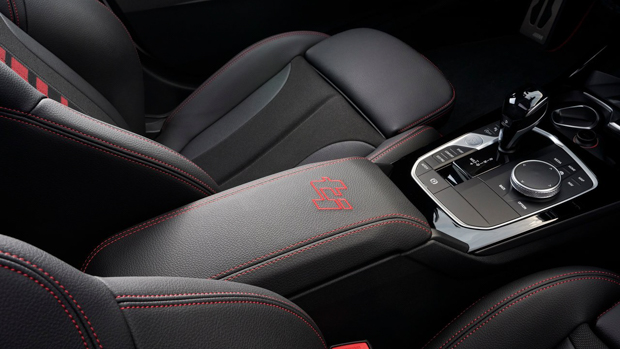
One of the big gains for the front-drive 1 Series is rear seat space. There is now enough room in the second row for someone of up to 182cm comfortably, though taller people will be able to put up with it for short distances.
The 128ti isn’t quite wide enough for three large passengers, but the much lower transmission tunnel makes it far more comfortable than the old car. There’s no fold-down armrest in the 128ti, but as in the front seats the door bins are large enough for a 1.5-litre water bottle and there are adjustable rear air vents.
The boot measures in at 380 litres (just one shy of the Golf GTI) and features tie-down points as well as netted cubbies off to the sides. However, there is no spare tyre under the floor, only a tyre repair kit and compressor.
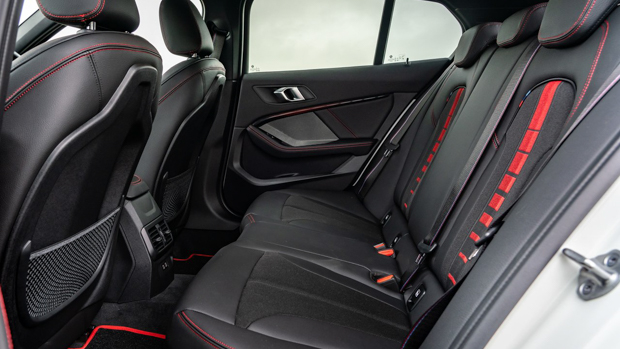
The Golf GTI similarities keep coming, with the 128ti returning 6.8L/100km in the ADR 81/02 combined fuel consumption cycle which is two tenths better than the Volkswagen (7.0L/100km).
Our testing that took in urban, highways and hilly back roads saw the 128ti return 9.8L/100km. BMW recommends a minimum of 95 RON premium unleaded fuel.
Servicing is required on a condition basis rather than set intervals for all BMWs in Australia.
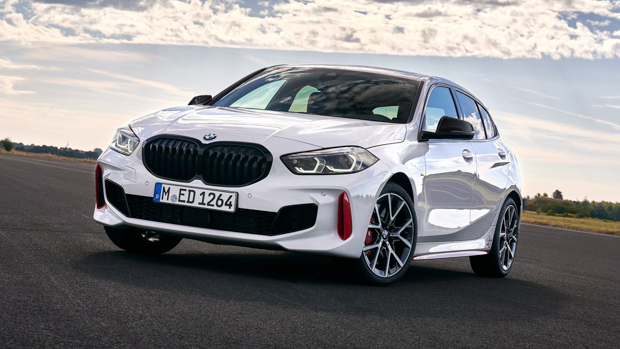
You can pre-purchase service plans for up to five years or 80,000km, and ‘basic’ coverage for the 128ti will cost $1650 which is more affordable than the Golf GTI ($2450 for five years/75,000km) and Hyundai i30 N DCT ($1675 for five years/50,000km).
BMW also offers extra coverage in a ‘plus’ package that includes new brake rotors, pads and windscreen wipers but increases the five year cost to $4340.
Unfortunately BMW only covers the 128ti (as it does all of its vehicles) with a three year/unlimited kilometre warranty that stands out among premium rivals such as Audi, Mercedes-Benz, Jaguar and Lexus which have moved to five year guarantees.
The new BMW 128ti had a clear mission: repair the reputation of the new 1 Series, which didn’t thrill fans in its launch 118i and M135i variants.
We can confidently declare that the 128ti is the best-driving and most involving 1 Series variant on sale right now, but it isn’t perfect. BMW’s first hot hatch that conforms to this segment’s front-drive norms is satisfying to drive, but it doesn’t equal the cohesive fluidity or driver engagement of the more deft Golf GTI, or the general raciness of the extroverted i30 N.
Instead the 128ti offers a different take on the segment: it’s quick, sophisticated and has an adequate level of sporty flair thanks to a tuneful engine note and hard working front limited-slip differential – and the technology is among the best available at this price, and far better than the Golf’s confused and crashy infotainment system.
A set of adaptive dampers would probably broaden this car’s appeal further, but the passive suspension set-up is ultimately about right for the 128ti’s athletic emphasis.
The intriguing BMW 128ti is worth a look if you’re looking for a Golf GTI adjacent vehicle with a more consistent technology package and premium badge. The sporty but never edgy ride and excellent cabin quality mean the 128ti arguably strikes a better balance of luxury and sportiness than many of its rivals.
Variant tested 28ti
Key specs (as tested)
About Chasing cars
Chasing Cars reviews are 100% independent.
Because we are powered by Budget Direct Insurance, we don’t receive advertising or sales revenue from car manufacturers.
We’re truly independent – giving you Australia’s best car reviews.
The estimate provided does not take into account your personal circumstances but is intended to give a general indication of the cost of insurance, in order to obtain a complete quote, please visit www.budgetdirect.com.au. Estimate includes 15%^ online discount.
^Conditions Apply
Budget Direct Insurance arranged by Auto & General Services Pty Ltd ACN 003 617 909(AGS) AFSL 241 411, for and on behalf of the insurer, Auto & General Insurance Company Limited(ABN 42 111 586 353, AFSL 285 571).Because we don’t know your financial needs, we can’t advise you if this insurance will suit you. You should consider your needs and the Product Disclosure Statement before making a decision to buy insurance. Terms and conditions apply.
Indicative quote based on assumptions including postcode , 40 year old male with no offences, licence suspensions or claims in the last 5 years, a NCD Rating 1 and no younger drivers listed. White car, driven up to 10,000kms a year, unfinanced, with no modifications, factory options and/or non-standard accessories, private use only and garaged at night.
^Online Discounts Terms & Conditions
1. Discounts apply to the premium paid for a new Budget Direct Gold Comprehensive Car Insurance, Third Party Property Only or Third Party Property, Fire & Theft Insurance policy initiated online on or after 29 March 2017. Discounts do not apply to optional Roadside Assistance.
2. Discounts do not apply to any renewal offer of insurance.
3. Discounts only apply to the insurance portion of the premium. Discounts are applied before government charges, taxes, levies and fees, including instalment processing fees (as applicable). The full extent of discounts may therefore be impacted.
4. We reserve the right to change the offer without notice.